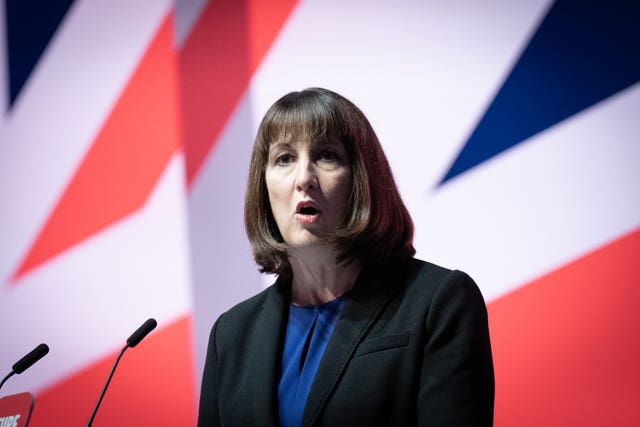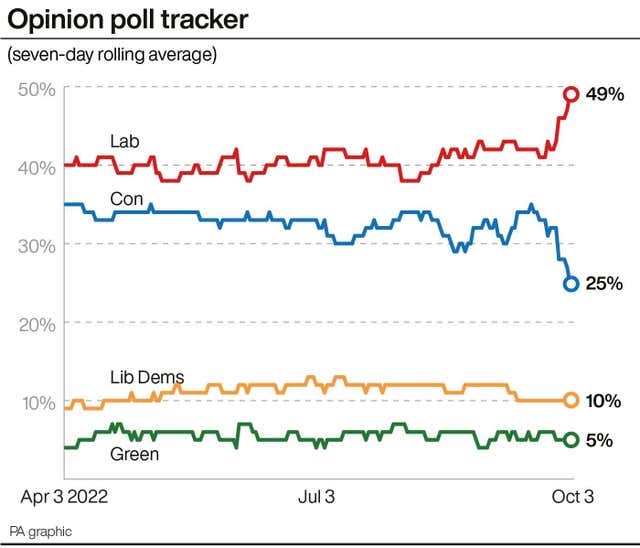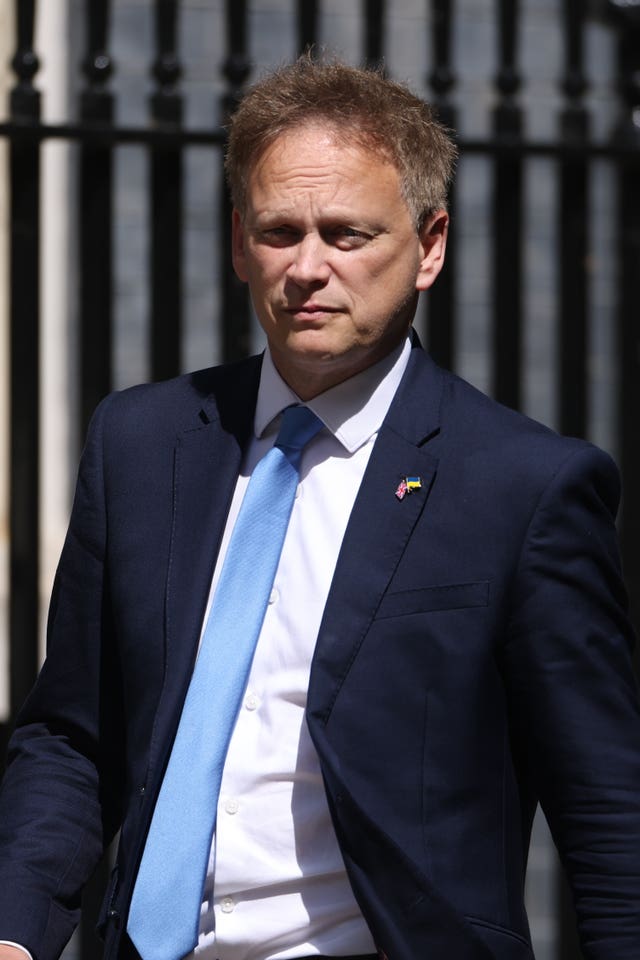Liz Truss is standing by Chancellor Kwasi Kwarteng after they abandoned their plan to abolish the top rate of income tax for the highest earners in an astonishing U-turn.
Downing Street said the Prime Minister continues to have confidence in Mr Kwarteng, despite the humiliating move to avert a Tory rebellion over their widely criticised strategy.
The Chancellor acknowledged that their desire to borrow billions to axe the 45% rate on earnings over £150,000 had become a “terrible distraction” amid widespread criticism.
Hours before he had been due to tell the Conservative Party conference they must “stay the course” on the plans, he issued a statement saying: “We are not proceeding with the abolition of the 45p tax rate.”
“We get it, and we have listened,” he added, in language echoed in a tweet from the Prime Minister less than 24 hours after she said she remained absolutely committed to the cut.
The U-turn will be seen as a massive blow to their authority, coming a little over a week after the tax cut was announced in the mini-budget and just a month into Ms Truss’s premiership.
Mr Kwarteng said he had “not at all” considered resigning despite scrapping a key part of the financial plans he set out on September 23.
Asked if Ms Truss has confidence in her Chancellor, the Prime Minister’s official spokesman told reporters: “Yes.”
Paul Johnson, the director of the Institute for Fiscal Studies think tank, said the reversal of the policy that would have cost £2 billion a year was only a “rounding error in the context of public finances”.
With around £43 billion of unfunded tax cuts remaining, Mr Johnson warned: “The Chancellor still has a lot of work to do if he is to display a credible commitment to fiscal sustainability.
“Unless he also U-turns on some of his other, much larger tax announcements, he will have no option but to consider cuts to public spending: to social security, investment projects, or public services.”
The chances of a Commons revolt diminished, with former Cabinet minister Michael Gove suggesting he could now support the package and fellow potential rebel Grant Shapps welcoming the U-turn.
Asked if he would now vote for the rest of the package, Mr Gove told Times Radio: “Well yeah I think so on the basis of everything that I know.”
Mr Shapps, a former transport secretary and a renowned strategist, told BBC Breakfast: “I’m very pleased to see him acknowledging that they understood it was the wrong move and fixing that problem.”
The Chancellor declined to directly apologise to the nation for the financial turmoil and rising mortgage rates and to Tory MPs who had been warned they could be kicked out of the parliamentary party for voting against the tax plans.
Instead he told BBC Radio 4’s Today programme: “There’s humility and contrition and I’m happy to own it.”
Mr Kwarteng suggested he had told Ms Truss they needed to back down amid signs of a growing rebellion from Conservative MPs.
“The conversation about the 45p rate was this terrible distraction really from what was a very, very strong plan and I’m very pleased that we’ve decided not to proceed with that because it was drowning out the elements of an excellent plan,” he told BBC Breakfast.
Ms Truss and Mr Kwarteng were to make a joint visit linked to the Tory conference on Monday but that was abandoned during the chaos.

Shadow chancellor Rachel Reeves called for them to reverse “their whole economic, discredited trickle-down strategy” as she said the U-turn had come “too late for the families who will pay higher mortgages and higher prices for years to come”.
The pound surged higher in overnight trading on Monday as reports emerged that the Government was preparing to U-turn.
Sterling hit 1.125 US dollars at one stage, recovering to levels seen before the mini-budget, though it pared back some of the gains in early morning trading to stand at 1.119.
Mr Kwarteng did not rule out a new era of austerity to pay for the surviving £43 billion of tax cuts in his mini-budget, nor did he say whether benefits will suffer real-terms cuts as inflation soars.
The Chancellor and Ms Truss had been doubling down on their plans despite the financial turmoil triggered by the package, with the Prime Minister defending the tax cut as recently as Sunday.
They had even resisted backing down in the face of criticism from the International Monetary Fund and a £65 billion emergency intervention by the Bank of England to restore order.

Mr Kwarteng had been preparing to tell the Birmingham conference that they must “stay the course” and back their tax plans.
And he had been set to insist in a speech now likely to be overhauled that his measures are vital to boost growth and avoid a “slow, managed decline”.
In a possible hint of what was to come, Ms Truss was criticised for singling Mr Kwarteng out as responsible for the tax cut on Sunday, saying “it was a decision the Chancellor made” rather than one debated by the entire Cabinet.
Spending around £2 billion annually on a tax cut for top earners while scrapping the cap on bankers’ bonuses was seen as politically toxic while millions face the squeeze of the cost-of-living crisis.
Ms Truss has also refused to commit to plans to increase benefits payments in line with inflation, in what would deliver the nation’s poorest a real-terms cuts.
On Sunday, Mr Gove toured fringe events at the conference to give his criticism of the plan, calling it “not Conservative” and hinting he could vote against the measure in the Commons.

Mr Shapps then used a Times column to say “this is not the time to be making big giveaways to those who need them least” because “when pain is around, pain must be shared”.
“This bolt-from-the-blue abolition of the higher rate, compounded by the lack in communication that the PM acknowledges, is an unforced error that is harming the Government’s economic credibility,” he said.
Damian Green, a former deputy prime minister, warned that the Tories will lose the next election if “we end up painting ourselves as the party of the rich”.
Widespread dismay at the fact that 3 years of work has effectively been put on hold. No one asked for this. C4 sale, online safety, BBC licence feee review – all signed off by cabinet all ready to go, all stopped. If Liz wants a whole new mandate, she must take to the country. https://t.co/xKtcnZyVYi
— Nadine Dorries (@NadineDorries) October 3, 2022
The decision over benefit levels could be the next battleground for Ms Truss and Mr Kwarteng.
Mr Gove told Times Radio that he would “need a lot of persuading” to support a Government that abandoned the commitment to uprate benefits in line with inflation.
And in a sign of wider anger in the party, former culture secretary Nadine Dorries suggested Ms Truss would need to call an election if she deviated from plans set out by Boris Johnson’s government.
There is “widespread dismay at the fact that three years of work has effectively been put on hold”, she said.
“If Liz wants a whole new mandate, she must take to the country.”




Comments: Our rules
We want our comments to be a lively and valuable part of our community - a place where readers can debate and engage with the most important local issues. The ability to comment on our stories is a privilege, not a right, however, and that privilege may be withdrawn if it is abused or misused.
Please report any comments that break our rules.
Read the rules hereLast Updated:
Report this comment Cancel